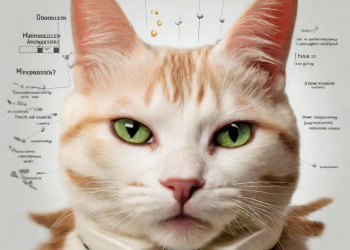Feline infectious peritonitis: a serious disease in cats
I researched feline infectious peritonitis and discovered that it is a viral disease that affects cats, causing inflammation in the abdomen and other serious symptoms. Although there are different types of peritonitis, all can be fatal if not treated in time. Fortunately, there are ways to prevent and treat this disease, and research is being done to find better treatments in the future.
What is feline infectious peritonitis?
Feline infectious peritonitis is a viral disease that affects cats and can be fatal if not treated in time.
Why should you read this article?
It is important to know the symptoms, diagnosis and treatment of feline infectious peritonitis to protect your cat and prevent its spread to other felines. Additionally, you will learn how to prevent this disease and how to care for a cat that suffers from it.
Types of feline infectious peritonitis
Wet peritonitis
Feline infectious peritonitis can present in a wet form, which involves the accumulation of fluid in the abdominal cavity. The following aspects are important to consider:
- Causes: Fluid buildup is due to inflammation of the lining of the abdomen.
- Symptoms: Abdominal pain, lethargy, loss of appetite.
- Diagnosis: Analysis of abdominal fluid to confirm the presence of the FIPV virus.
- Treatment: Pain control, drainage of fluid, medications to reduce inflammation.
Dry peritonitis
Feline infectious peritonitis can also manifest itself in a dry form, with the formation of lesions in internal organs. The relevant aspects are detailed below:
- Causes: The formation of lesions is due to the cat’s immune response to the FIPV virus.
- Symptoms: Weight loss, intermittent fever, jaundice.
- Diagnosis: Biopsy of affected organs to confirm the presence of the virus.
- Treatment: Focus on symptom management, medications to reduce immune response.
Risk factors for feline infectious peritonitis
Feline infectious peritonitis is a disease that can affect any cat, but there are certain factors that can increase the risk of contracting it. These factors include:
A. Age
Young cats and older cats are at higher risk of developing feline infectious peritonitis. Kittens under two years of age and cats over ten years of age are especially susceptible to the disease.
B. Race
Some cat breeds, such as Siamese and long-haired cats, appear to be at increased risk of developing feline infectious peritonitis. However, the disease can affect cats of any breed.
C. Weakened immune system
Cats with weakened immune systems, either due to chronic illnesses or medical treatments that suppress the immune system, are at increased risk of contracting feline infectious peritonitis.
D. Living environment
Cats living in environments with a high feline population density, such as shelters or catteries, are at increased risk of exposure to feline infectious peritonitis virus and therefore at increased risk of contracting the disease.
E. Other animals in the home
The presence of other cats in the household may increase the risk of transmission of feline infectious peritonitis, especially if any of the cats are infected with the FIPV virus. It is important to take precautions to prevent the spread of the disease among cats in the home.
Transmission of feline infectious peritonitis
Feline infectious peritonitis (FIP) is caused by the feline infectious peritonitis virus (FIPV), which is a mutated form of the feline coronavirus. Transmission of FIP can occur in several ways, both directly and indirectly.
A. Feline infectious peritonitis virus (FIPV)
The feline infectious peritonitis virus is highly contagious and can survive in the environment for weeks, making it especially dangerous for cats.
B. Forms of contagion
- Direct: Direct transmission occurs through contact with infected cats, either through saliva, nasal or eye secretions, or contaminated feces.
- Indirect: Indirect transmission can occur through contaminated objects, such as food bowls, water bowls, litter boxes, or even the clothing or hands of people who have been in contact with infected cats.
C. Prevention
To prevent the transmission of feline infectious peritonitis, it is important to take precautionary measures, especially in environments with multiple cats, such as shelters or catteries.
- Vaccination: Although there is no completely effective vaccine against FIP, vaccination can help reduce the risk of infection in certain cases.
- Proper hygiene and cleaning: Maintaining a clean and disinfected environment can help prevent the spread of the virus.
- Isolation of sick cats: If FIP is suspected, it is important to isolate the sick cat to prevent transmission to other animals.
Diagnosis of feline infectious peritonitis
Diagnosing feline infectious peritonitis can be challenging due to the variety of symptoms and the need to rule out other diseases. Veterinarians use a combination of methods to reach an accurate diagnosis.
Physical exam
The veterinarian will perform a complete physical examination of the cat, paying special attention to symptoms associated with feline infectious peritonitis, such as fluid buildup in the abdomen.
Blood test
Blood tests may be performed to look for signs of inflammation and abnormalities in white blood cells, which may indicate the presence of feline infectious peritonitis.
Abdominal fluid analysis
Removal and analysis of abdominal fluid may reveal the presence of proteins and cells associated with feline infectious peritonitis.
Biopsy
In some cases, a tissue biopsy may be performed to confirm the diagnosis of feline infectious peritonitis.
Other complementary exams
Depending on the cat’s clinical presentation, the veterinarian may recommend other tests, such as imaging tests, to help confirm the diagnosis of feline infectious peritonitis.
An accurate diagnosis is crucial to initiate appropriate treatment and improve the chances of recovery of the cat affected by feline infectious peritonitis.
Treatment of feline infectious peritonitis
Treatment of feline infectious peritonitis focuses on symptom management, use of medications, supportive therapy, and, in some cases, experimental treatments.
A. Symptom management
- Pain control: Analgesics are used to relieve the discomfort caused by the disease.
- Hydration: It is essential to keep the cat well hydrated to help fight the infection.
- Nutrition: A high-quality, balanced diet should be provided to strengthen the cat’s immune system.
B. Medications
- Anti-inflammatories: They help reduce inflammation caused by the disease.
- Immunosuppressants: These are used to modulate the cat’s immune response and reduce damage caused by excessive inflammation.
- Antibiotics: In some cases, antibiotics are prescribed to treat secondary infections.
C. Supportive therapy
- Blood transfusions: In cases of severe anemia, blood transfusions may be required to improve the cat’s health.
- Vitamin supplements: They help strengthen the immune system and improve the cat’s general health.
- Intravenous fluid therapy: Used to maintain the cat’s hydration and electrolyte balance.
D. Experimental treatments
In some cases, experimental treatments may be considered as part of a comprehensive approach to treating feline infectious peritonitis. These treatments are in the research phase and may offer new options for managing the disease.
VII. Prognosis of feline infectious peritonitis
Feline infectious peritonitis is a serious disease that may have a guarded prognosis. The outcome of the disease may vary depending on several factors.
A. Factors affecting prognosis
- Type of feline infectious peritonitis: The wet form tends to have a more severe prognosis than the dry form.
- Age of the cat: Younger cats tend to have a more guarded prognosis.
- General health: Cats with weakened immune systems have a less favorable prognosis.
B. Possible complications
Feline infectious peritonitis can lead to serious complications, such as kidney failure, respiratory problems, and other disorders related to chronic inflammation.
C. Euthanasia
In cases of advanced feline infectious peritonitis and with a very guarded prognosis, euthanasia can be considered as a compassionate option to prevent the cat’s suffering.
Prevention of feline infectious peritonitis
Vaccination
Vaccination is a key measure to prevent feline infectious peritonitis in cats. Be sure to keep your pet’s vaccinations up to date, including the feline infectious peritonitis vaccine.
Cat population control
Avoid overcrowding cats in your home or in community spaces, as this can increase the risk of transmission of feline infectious peritonitis.
Proper hygiene and cleaning
Maintain a clean and disinfected environment to reduce the spread of the feline infectious peritonitis virus. Regularly wash your cats’ dishes and beds, and clean the litter box regularly.
Isolation of sick cats
If you have a sick cat with feline infectious peritonitis, be sure to isolate it from other cats to prevent transmission of the virus.
Avoid exposure to infected cats
If possible, avoid direct contact with cats infected with feline infectious peritonitis, as this may increase the risk of infection for your pets.
Living with a cat with feline infectious peritonitis
If your cat has been diagnosed with feline infectious peritonitis, it is important to provide it with the special care it needs. Here we offer you some considerations for living with a cat that suffers from this disease:
Special cares
- Provides a calm and comfortable environment for your cat, avoiding stress and anxiety.
- Maintain a balanced, high-quality diet to strengthen your immune system.
- Provide regular veterinary care to monitor their health and manage symptoms.
Chronic disease management
- Feline infectious peritonitis can become a chronic disease, so it is important to be prepared for long-term management.
- Follow the veterinarian’s instructions for the treatment and control of the disease.
- Consult a feline medicine specialist for specific guidance on chronic disease management.
emotional considerations
- It is natural to feel worry, sadness or frustration when living with a sick cat. Seek emotional support if you need it.
- Provide love, care, and companionship to your cat, which can be comforting for both your cat and you.
- Look for activities that strengthen the bond with your pet, such as gentle play or relaxing time together.
Support and resources for owners of cats with feline infectious peritonitis
- Look for support groups online or in your community, where you can share experiences and get advice from other owners of cats with feline infectious peritonitis.
- Find out about veterinary resources and services specialized in the management of this disease.
- Consider participating in research or clinical trials related to feline infectious peritonitis, which may offer new treatment options.
Research and advances in the treatment of feline infectious peritonitis
Feline infectious peritonitis is a complex and devastating disease that has challenged veterinarians and scientists for decades. However, in recent years, there have been significant advances in the understanding and treatment of this disease. Below are some of the most promising research and advances in the field of feline infectious peritonitis:
Experimental therapies
- Clinical studies are underway to test experimental therapies that aim to combat feline infectious peritonitis virus (FIPV) more effectively.
- These therapies include the use of antiviral medications and immunomodulatory agents that could help control virus replication and reduce inflammation associated with the disease.
New vaccines
- Researchers are working on developing new vaccines that are safer and more effective in preventing feline infectious peritonitis.
- These vaccines are designed to stimulate a more specific and long-lasting immune response against the FIPV virus, providing greater protection for cats.
Genetic studies
- Genetic studies are being conducted to identify possible genetic factors that may influence a cat’s susceptibility to developing feline infectious peritonitis.
- These studies could help identify genetic markers that can predict which cats are at higher risk of developing the disease, which would facilitate the implementation of preventive measures.
Research on the FIPV virus
- Scientists continue to investigate the unique characteristics of the FIPV virus, including its life cycle, immune system evasion mechanisms, and potential vulnerabilities for the development of more effective treatments.
- These investigations are essential to advance the understanding of feline infectious peritonitis and for the development of more precise and targeted therapeutic strategies.
These advances in feline infectious peritonitis research offer hope for the future, both in terms of prevention and treatment of the disease. As research continues and new therapeutic strategies are developed, it is possible that this devastating feline disease will be more effectively controlled and prevented in the future.
Conclusions
After discussing feline infectious peritonitis, it is evident that this disease represents a significant challenge for cat owners and veterinarians. Some important takeaways include:
Summary of Feline Infectious Peritonitis
- Feline infectious peritonitis is a viral disease that affects cats and can occur in wet or dry form.
- It is caused by the feline infectious peritonitis virus (FIPV) and can be difficult to diagnose and treat.
Importance of prevention and early diagnosis
- Prevention of feline infectious peritonitis through vaccination, cat population control, and proper hygiene is crucial to prevent the spread of the disease.
- Early diagnosis is essential to improve the prognosis and quality of life of affected cats.
Future of research and treatment of the disease
- Current research focuses on experimental therapies, new vaccines and genetic studies to develop more effective treatments against feline infectious peritonitis.
- We hope that in the future significant advances will be made in the understanding and management of this devastating disease for cats.
Sources consulted
Scientific articles
To obtain precise information on feline infectious peritonitis, numerous scientific articles published in journals specialized in veterinary medicine were consulted. These articles provided relevant data on the definition, causes, symptoms, diagnosis, treatment and prevention of feline infectious peritonitis.
Veterinary organizations and associations
Various veterinary organizations and associations were consulted for updated guidelines and recommendations on the management of feline infectious peritonitis. These entities offer valuable information to animal health professionals and cat owners seeking guidance on this disease.
Personal experiences of cat owners with feline infectious peritonitis
The experiences shared by cat owners who have faced feline infectious peritonitis provided unique perspectives on the emotional impact and special care needs required for cats affected by this disease. These experiences helped to better understand the challenges that both cats and their owners face in managing feline infectious peritonitis.











